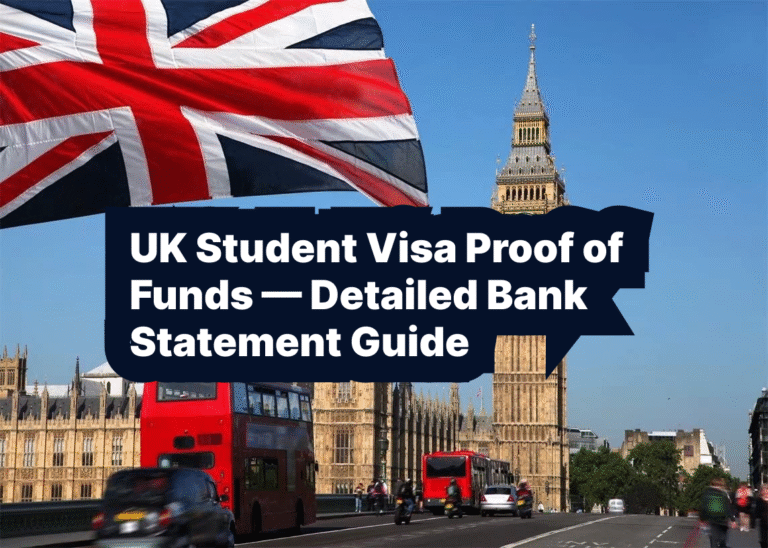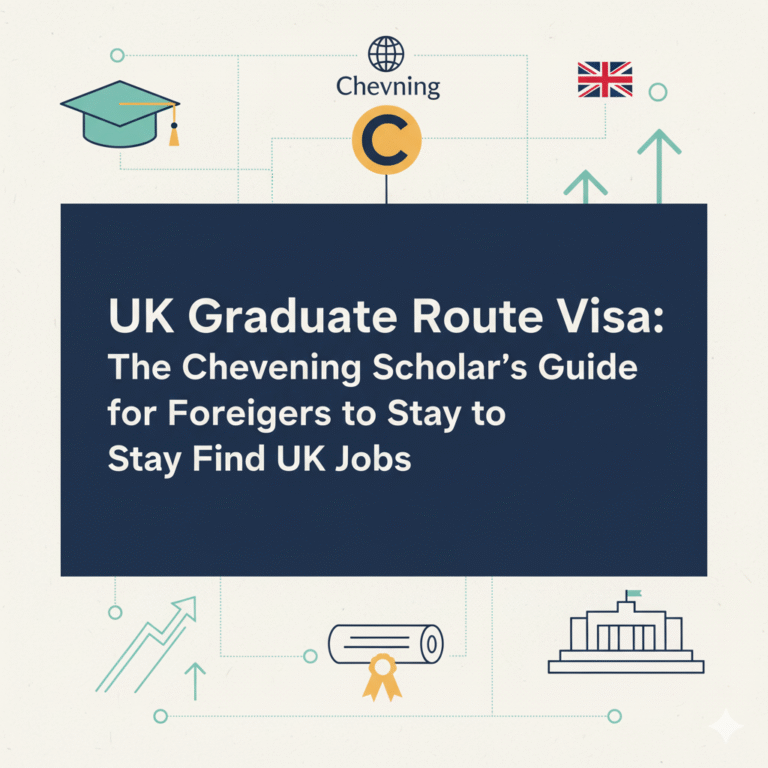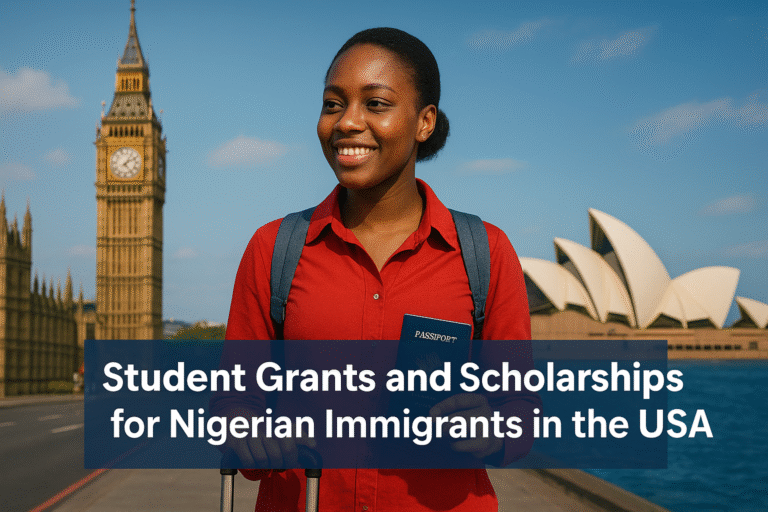Completing a Chevening Scholarship represents an extraordinary achievement, placing you among an elite group of future leaders who have experienced world-class education in the United Kingdom. However, as your master’s program concludes, many Chevening Scholars face a crucial decision: return home immediately or explore opportunities to gain professional experience in the UK before embarking on your leadership journey. The UK Graduate visa route provides exactly this opportunity, allowing recent graduates to remain in Britain for two to three years to work, seek employment, or establish entrepreneurial ventures.
This comprehensive guide explains everything Chevening Scholars need to know about the Graduate visa route, from eligibility requirements and application procedures to strategic job search approaches and maximizing your UK experience before returning home to make your impact.
Understanding the UK Graduate Visa
What is the Graduate Visa?
The Graduate visa, introduced in July 2021, allows international students who have successfully completed eligible UK degrees to remain in the country for an extended period without requiring job sponsorship. This visa category specifically addresses the gap between completing studies and either securing employment or developing professional networks before returning to home countries.
For most graduates, including Chevening Scholars who complete master’s degrees, the Graduate visa permits a two-year stay in the UK. Doctoral graduates receive three years. During this period, visa holders can work in any role at any skill level, switch employers freely, be self-employed, and seek permanent employment without restrictions.
Importantly, the Graduate visa provides flexibility unavailable under student visas, removing the twenty-hour weekly work limit during term time and permitting full-time employment across all sectors and industries.
Key Benefits for Chevening Scholars
Chevening Scholars are uniquely positioned to leverage the Graduate visa for several reasons:
Professional network development – Your Chevening year connects you with accomplished alumni, academic leaders, and industry professionals. Two additional years allow you to transform these connections into tangible career opportunities and collaborative relationships extending beyond your UK stay.
Practical experience in your field – Chevening selections emphasize leadership potential and sectoral expertise. The Graduate visa enables you to gain practical experience in British organizations, learning operational approaches, management methodologies, and industry standards that enhance your effectiveness when returning home.
Enhanced global credentials – UK work experience, particularly with recognized British organizations, strengthens your professional profile internationally. This experience demonstrates adaptability, cross-cultural competence, and international standards familiarity—qualities valued by governments, NGOs, and multinational corporations.
Research and knowledge transfer – For scholars focused on academic, scientific, or technical fields, the Graduate visa period allows continuation of research collaborations, knowledge transfer activities, and maintaining connections with UK institutions that can facilitate ongoing partnerships.
Personal and professional growth – Living and working independently in the UK, outside the structured environment of student life, develops resilience, professional maturity, and cultural understanding that enriches your leadership capacity.
Eligibility Requirements
Academic Qualifications
To qualify for a Graduate visa, you must have successfully completed an eligible course at a UK higher education provider with a track record of compliance. Chevening Scholars studying at UK universities automatically meet this requirement, as Chevening partnerships only include approved institutions.
Your qualification must be at least bachelor’s degree level. Master’s degrees, which most Chevening Scholars complete, clearly satisfy this criterion. The course must appear on your Confirmation of Acceptance for Studies (CAS), the document provided when you received your student visa.
Current Immigration Status
You must apply for the Graduate visa while physically present in the UK and before your current student visa expires. This timing is critical—applications made after visa expiry or from outside the UK will be refused without refund.
Your most recent visa must have been a Student visa or Tier 4 (General) student visa. You must have held this visa for your entire final academic year or for the entire duration if your course lasted less than twelve months.
Completion of Studies
You must have successfully completed your course, meaning you’ve met all academic requirements and your institution has notified the Home Office of your successful completion. Universities typically inform the Home Office within a few weeks of your final assessment completion or graduation ceremony.
Some Chevening Scholars complete their studies before their official graduation ceremony. You do not need to attend graduation to apply for the Graduate visa—course completion and institutional notification suffice.
Additional Requirements
You must demonstrate ability to support yourself financially, though the requirements are less stringent than student visa financial requirements. You must also not have breached immigration conditions during your studies, including work restrictions or reporting requirements.
Importantly, there are no English language testing requirements for the Graduate visa, as your successful completion of a UK degree program demonstrates sufficient English proficiency.
Application Process
When to Apply
You can apply for the Graduate visa once your education provider confirms to the Home Office that you’ve successfully completed your course. This confirmation typically occurs within two to four weeks after your final assessments or dissertation submission.
Applications must be submitted before your current student visa expires. Given processing times, applying approximately three to six weeks before visa expiry is advisable, ensuring adequate time for processing while maximizing your student visa period.
Required Documents
The application requires several key documents:
Current passport – Your valid passport showing your current UK visa
Biometric Residence Permit (BRP) – The card issued when you entered the UK on your student visa
CAS number – Your Confirmation of Acceptance for Studies reference number, found on the letter your university provided for your student visa application
Proof of course completion – In most cases, the Home Office will verify completion directly with your institution. However, having your official transcript, completion letter, or degree certificate available is advisable
Financial evidence – Though not always requested, bank statements showing you can support yourself during the Graduate visa period may be required
Application Method
Graduate visa applications are submitted online through the UK government’s visa application portal. The process involves:
- Creating an online account and completing the application form with personal details, education information, and residential history
- Paying the application fee (currently £822 as of 2024)
- Paying the Immigration Health Surcharge (£1,035 annually, so £2,070 for the two-year Graduate visa)
- Scheduling and attending a biometric appointment at a UK Visa and Citizenship Application Services (UKVCAS) center
- Scanning your identification documents using the UK Immigration: ID Check app (if using a biometric passport) or submitting physical documents at your appointment
Processing Time
Standard Graduate visa processing typically takes eight weeks, though many applications are decided within two to four weeks. During this period, you can continue living in the UK under Section 3C leave, which extends your legal status while awaiting a decision.
If your application is straightforward and all documents are in order, you may receive a decision more quickly. Complex cases or applications requiring additional verification may take longer.
Decision and BRP Collection
If your application is approved, you’ll receive a decision letter and instructions for collecting your new Biometric Residence Permit. The BRP will show your Graduate visa status and validity dates. Keep this document secure, as you’ll need it for employment verification, travel, and other official purposes.
Strategic Job Search for Chevening Scholars
Understanding the UK Job Market
The UK employment landscape differs significantly from many countries, with specific cultural norms, application expectations, and hiring timelines that Chevening Scholars should understand.
Application processes are formal and documented – British employers expect tailored CVs, specific cover letters addressing job criteria, and structured interview responses demonstrating competencies with concrete examples.
Professional networks matter significantly – The phrase “it’s not what you know, it’s who you know” holds particular relevance in the UK job market. Networking events, professional associations, and alumni connections frequently lead to opportunities unavailable through public advertisements.
Sector-specific variations exist – The public sector, private sector, and nonprofit organizations maintain distinct hiring practices, timelines, and expectations. Understanding your target sector’s norms is essential.
Leveraging Your Chevening Network
The Chevening alumni network represents one of your most valuable assets in the UK job search:
Connect with UK-based alumni – Thousands of Chevening alumni work in the UK across sectors and industries. The Chevening Alumni Association of the UK facilitates connections with these individuals, who often welcome opportunities to support recent scholars.
Engage with your university’s career services – Most UK universities maintain dedicated career services offering CV reviews, interview preparation, job search resources, and employer connections. Many services remain available to recent graduates, particularly during your Graduate visa period.
Attend Chevening networking events – The Foreign, Commonwealth & Development Office (FCDO) and Chevening Secretariat organize events throughout the year where scholars can meet alumni, employers, and sector leaders.
Utilize LinkedIn strategically – Connect with Chevening alumni in your sector, engage with content from UK-based professionals, and showcase your Chevening experience prominently. Many alumni actively support recent scholars through their networks.
Sectors Actively Hiring International Talent
Certain UK sectors particularly value international perspectives and actively recruit graduates with diverse backgrounds:
International development and NGOs – Organizations like Oxfam, Save the Children, CARE International, and ActionAid maintain UK operations and value professionals with understanding of developing country contexts.
Consulting firms – Management consultancies including the Big Four (Deloitte, PwC, EY, KPMG), McKinsey, Boston Consulting Group, and boutique firms seek diverse perspectives and international experience.
Technology companies – The UK’s thriving tech sector, centered in London, Manchester, Edinburgh, and Cambridge, actively recruits international talent across engineering, product management, data science, and business roles.
Financial services – London’s position as a global financial center creates opportunities in banking, investment management, fintech, and related services for candidates with quantitative skills and international awareness.
Education and research – Universities, research institutions, and educational organizations employ international graduates in research, program management, and administrative roles.
Healthcare and public health – The NHS, public health agencies, and health-focused charities recruit professionals with diverse backgrounds, particularly those with relevant qualifications and experience.
Think tanks and policy organizations – Organizations like Chatham House, the Institute for Public Policy Research, and sector-specific think tanks value international perspectives in research and policy analysis.
Application Strategies
Tailor applications meticulously – Generic applications rarely succeed in the competitive UK job market. Each application should address specific job criteria, using keywords from the job description and demonstrating clear understanding of the organization.
Emphasize transferable skills – Your Chevening selection already demonstrates leadership potential, analytical ability, and commitment to creating change. Frame your experience to highlight skills directly relevant to target roles.
Address your visa status positively – Your Graduate visa means employers face no sponsorship obligations or restrictions on hiring you. Clearly state your visa status and work authorization in applications and interviews.
Prepare for competency-based interviews – UK employers frequently use structured competency-based interview formats. Prepare specific examples demonstrating leadership, problem-solving, teamwork, communication, and other key competencies using the STAR method (Situation, Task, Action, Result).
Consider temporary and contract positions – Short-term roles provide UK work experience, income during your job search, professional references, and networking opportunities that can lead to permanent positions.
Explore graduate schemes and development programs – Many large UK employers operate structured graduate programs offering rotations, training, and clear progression pathways. These programs typically recruit annually with specific application deadlines.
Practical Considerations
Financial Planning
Working in the UK during your Graduate visa period requires careful financial planning:
Understand UK taxation – You’ll pay income tax and National Insurance contributions on earnings above certain thresholds. The tax-free personal allowance (£12,570 for 2024-25) means you pay no tax on earnings below this amount annually.
Budget for living costs – London remains expensive, with average monthly costs (excluding rent) around £1,000-1,500. Other UK cities offer more affordable living while still providing excellent career opportunities.
Consider accommodation options – Moving from student accommodation to professional housing requires deposits, advance rent, and potentially higher monthly costs. Flat-sharing remains common among young professionals and significantly reduces expenses.
Maintain savings – Job searches can take several months. Maintaining savings covering three to six months of living expenses provides security during your search and transition.
Building Professional Credentials
Your two years in the UK should enhance your professional profile:
Pursue relevant certifications – Industry-recognized qualifications in project management (PRINCE2), data analysis, language skills, or sector-specific certifications strengthen your profile for roles both in the UK and upon returning home.
Document your achievements – Maintain records of projects, results, testimonials, and accomplishments. These become valuable evidence for future applications and promotional materials.
Develop your professional brand – Maintain an updated LinkedIn profile, engage with industry content, potentially write articles or blog posts demonstrating expertise, and actively participate in professional communities.
Seek mentorship – Identify professionals in your field who can provide guidance, introductions, and perspective on career development. Many senior professionals welcome mentoring relationships.
Maintaining Home Country Connections
While working in the UK, maintaining connections with your home country remains important:
Engage with diaspora communities – Most countries have active diaspora communities in UK cities, organizing cultural events, professional networks, and mutual support systems.
Stay informed about home country developments – Maintain awareness of political, economic, and social changes affecting your country, as this knowledge proves valuable when you return.
Cultivate relationships with home country organizations – Stay connected with previous employers, government ministries, or organizations where you plan to apply your skills upon return.
Document transferable learning – Regularly reflect on skills, knowledge, and practices from your UK experience that could be adapted and applied in your home context.
Transitioning to Long-Term Status (Optional)
While Chevening Scholars typically commit to returning home, understanding options for longer UK stays proves valuable for some circumstances:
Skilled Worker Visa
If you secure employment with a licensed sponsor offering a qualifying role, you can switch from a Graduate visa to a Skilled Worker visa. This route provides up to five years’ stay and potential pathways to permanent settlement.
Requirements include a job offer from a licensed sponsor, meeting minimum salary thresholds (typically £38,700 or the “going rate” for the occupation, whichever is higher), and meeting English language requirements (satisfied by your UK degree).
Global Talent Visa
Exceptional leaders or promising individuals in academia, research, arts, culture, or digital technology may qualify for the Global Talent visa, providing five years’ stay and significant flexibility without employer sponsorship requirements.
Innovator Founder Visa
Entrepreneurs with innovative, viable, and scalable business ideas endorsed by an approved endorsing body may qualify for this route, allowing extended stay to develop business ventures.
Important Note on Chevening Obligations
Remember that Chevening Scholarships include a return commitment, typically requiring scholars to return to their home countries for at least two years following scholarship completion. While the Graduate visa allows you to work in the UK during this period, carefully review your Chevening terms and conditions regarding longer-term settlement pathways and any required approvals from the FCDO or your nominating body.
Making the Most of Your Graduate Visa Period
Professional Development Priorities
Focus your Graduate visa period on activities with lasting impact:
Gain practical experience – Prioritize roles providing hands-on experience in your field, even if they’re not perfect matches for your ultimate career goals.
Develop UK-specific expertise – Learn regulatory frameworks, industry standards, operational approaches, and professional practices that can inform your work upon returning home.
Build enduring relationships – Invest in relationships with colleagues, mentors, clients, and collaborators who can remain contacts throughout your career.
Understand organizational culture – Observe how successful UK organizations operate, make decisions, manage teams, and address challenges.
Document everything – Keep detailed records of projects, methodologies, tools, and approaches you can adapt in your home context.
Cultural and Personal Growth
Beyond professional development, your Graduate visa period offers personal enrichment:
Travel within the UK – Explore Britain’s diverse regions, historical sites, cultural attractions, and natural landscapes.
Engage with British culture – Attend theater, concerts, sporting events, and cultural festivals, deepening your understanding of British society.
Develop lasting friendships – Invest in relationships beyond professional networking, building genuine friendships that transcend geographical distance.
Reflect on your learning – Regularly consider how your UK experience shapes your worldview, leadership approach, and vision for creating change in your home country.
Preparing for Your Return
As your Graduate visa period concludes, begin preparing for your return:
Career Planning
Update your professional materials – Revise your CV emphasizing UK experience, highlighting achievements and skills gained.
Identify target organizations – Research potential employers in your home country that value UK experience and align with your career goals.
Reconnect with home networks – Re-establish connections with former colleagues, professors, and professional contacts in your country.
Consider timing strategically – Plan your return to align with hiring cycles, key projects, or opportunities in your target sector.
Knowledge Transfer
Organize your learning – Compile resources, templates, frameworks, and materials you can apply in your new role.
Prepare case studies – Document successful projects or approaches you can share with colleagues in your home country.
Maintain UK connections – Establish clear plans for staying connected with UK colleagues, mentors, and collaborators after your return.
Conclusion
The UK Graduate visa represents an extraordinary opportunity for Chevening Scholars to extend their British experience, gain valuable professional credentials, and develop capabilities that will amplify their impact as future leaders. The two-year period allows you to transition from accomplished student to experienced professional, building networks, knowledge, and skills that will serve your leadership journey for decades to come.
Approach your Graduate visa period strategically, balancing professional development with personal growth, maintaining home country connections while fully engaging with UK opportunities, and consistently preparing for the moment when you return home to apply your enhanced capabilities toward creating the change you envision.
Your Chevening Scholarship identified you as a future leader with extraordinary potential. Your Graduate visa period provides the time and space to develop that potential further, ensuring that when you return home, you do so equipped not just with a prestigious master’s degree, but with practical experience, global networks, and proven capabilities to lead meaningful change in your country and beyond.







